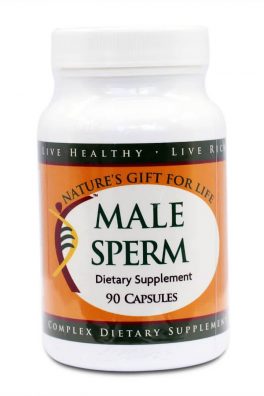Male Infertility
DOCTORS RECOMMENDED PRODUCTS
-
Male Infertility
Male Sperm Booster (Male Infertility)
0 out of 5(0)
Benefits of this product for (Male Infertility)- Improves sperm count and motility, along with increasing sexual desire and ejaculation
- Contains key vitamins and minerals essential for proper sperm production and function
>>>Read More
SKU: n/a -
Male Infertility
Herbal Male Fertility 60Cap(Male Infertility)
0 out of 5(0)
Benefits of this product for (Male Infertility)
- Herbal Male Fertility
- Supports the function of male sexual organs (prostate, seminal vesicles, testes, penis)
- Helps to maintain healthy sperm production, motility, and health
>>>Read More
SKU: n/a
Male Infertility
Infertility is typically diagnosed when a couple is unable to achieve pregnancy after a year of unprotected intercourse, (or after six months if the woman is over age 35). Infertility in a couple may be due to a medical problem in the man, the woman, or both. When the source of the problem exists with the male partner, it is referred to as male infertility. Male infertility issues contribute to approximately 50% of all infertility cases. Sperm disorders account for the most common male infertility causes, and are often symptomatic of other diseases or disorders.
Male Infertility
Sperm must be properly shaped and able to move rapidly and accurately toward the egg for fertilization to occur. If the shape and structure (morphology) of the sperm are abnormal or the movement (motility) is impaired, sperm may not be able to reach or penetrate the egg. To that end, a semen analysis is often critical in determining the exact cause of male infertility. The analysis looks at several factors, including:
Read More...
• Semen volume: Normal volume is 1.0-6.5 milliliters (mL) per ejaculate. In very rare cases, there is an absence of semen, referred to as aspermia.
• Sperm count: Normal sperm count is defined by the WHO as over 20 million sperm per ml. A count under 20 million/ml is called oligospermia while the absence of sperm altogether is called azoospermia.
• Sperm motility: Forward motion capacity. Normal motility is about 8 million sperm per ml showing good motility.
• Sperm morphology: Measuring how many sperm are shaped normally, in which 70% indicates good morphology. Abnormally shaped sperm possess aberrant qualities of the head (two heads, tiny heads, round heads) or tail (two tails, short tails). These shapes tend to affect their motility as well.
• Other semen qualities: Other male infertility causes include liquefaction time, pH levels, and fructose levels. An off-average number in any factor can indicate infertility.
Causes Of Male Infertility Impaired production or function of sperm. As previously mentioned, most cases of male infertility are due to problems with the sperm. These issues can be tied to other conditions such as: Varicocele (a varicose vein in the scrotum that may prevent normal cooling of the testicle, leading to reduced sperm count and motility); Undescended testicle; Testosterone deficiency (male hypogonadism); Genetic defects like Klinefelter’s syndrome. Infections: Infection may temporarily affect sperm motility. Repeated bouts of sexually transmitted diseases (STDs), such as Chlamydia and gonorrhea, are most often associated with male infertility. These infections can cause scarring and block sperm passage. If the man had mumps after puberty, inflammation of the testicles at that time could impair sperm production. Inflammation of the prostate (prostatitis), urethra, or epididymis also may alter sperm motility. Impaired delivery of sperm. Problems with the delivery of sperm from the penis into the vagina can result in infertility. These may include:
• Sexual issues: Problems with sexual intercourse or technique including: erectile dysfunction, premature ejaculation, painful intercourse, and psychological or relationship problems can impair sperm delivery. The use of lubricants, such as oils or petroleum jelly, can also be toxic to sperm.
• Retrograde ejaculation: This occurs when semen enters the bladder during orgasm rather than emerging out through the penis. Various conditions can cause retrograde ejaculation including diabetes, bladder, prostate or urethral surgery, and the use of certain medications.
• Blockage of epididymis or ejaculatory ducts: Some men are born with blockage of the part of the testicle that contains sperm (epididymis) or ejaculatory ducts. Some men lack the tube that carries sperm (vas deferens) from the testicle out to the opening in the penis.
• No semen (ejaculate): The absence of ejaculate may occur in men with spinal cord injuries or diseases. This is the fluid carries the sperm from the penis into the vagina.
• Misplaced urinary opening(hypospadias): A birth defect can cause the urinary (urethral) opening to be abnormally located on the underside of the penis. If not surgically corrected, this condition can prevent sperm from reaching the woman’s cervix.
• Anti-sperm antibodies: Antibodies that target sperm and weaken or disable them usually occur after surgical blockage of part of the vas deferens for male sterilization (vasectomy). Presence of these antibodies may complicate the reversal of a vasectomy.
• Cystic fibrosis: Men with cystic fibrosis often have an obstructed or missing vas deferens
In many instances, no cause for reduced sperm production is found. When sperm concentration is less than 5 million per ml of semen, genetic causes could be involved. A blood test can reveal whether there are subtle changes in the Y chromosome.
General health and lifestyle A man’s general health and lifestyle may affect fertility. Some common causes of infertility related to health and lifestyle include:
Obesity Emotional stress
Malnutrition – Deficiencies in nutrients such as vitamin C, selenium, zinc and folate may contribute to infertility
Cancer and its treatment – Both radiation and chemotherapy treatment for cancer can impair sperm production. The closer the radiation treatment is to the testicles, the higher the risk of infertility. Removal of one or both testicles due to cancer may also affect fertility.
Alcohol and drugs – Alcohol or drug dependency can be associated with poor health and reduced fertility. The use of certain drugs also can contribute to infertility. Anabolic steroids, for example, can cause the testicles to shrink and sperm production to decrease. Use of cocaine or marijuana may temporarily reduce the number and quality of your sperm.
Smoking – Men who smoke cigarettes may have a lower sperm count than do those who don’t smoke.
OTHER MEDICAL CONDITIONS A severe injury or major surgery can affect fertility. Certain diseases or conditions, such as diabetes, thyroid disease, Cushing’s syndrome, or anemia may be associated with infertility. Age – A gradual decline in fertility is common in men older than 35.
Environmental Concerns Overexposure to certain environmental elements such as heat, toxins, and chemicals can reduce sperm count either directly by affecting testicular function or indirectly by altering the male hormonal system. Specific causes include:
• Pesticides and other chemicals. Herbicides and insecticides may cause female hormone-like effects in the male body and may be associated with reduced sperm production and testicular cancer. Lead exposure may also cause infertility.
• Overheating the testicles. Frequent use of saunas or hot tubs can elevate your core body temperature. This may impair your sperm production and lower your sperm count.
Proper testing should be performed to determine the potential cause of male infertility. Sometimes, no specific cause can be identified. In many cases, infertility is a harmless problem and responds readily to treatment.


